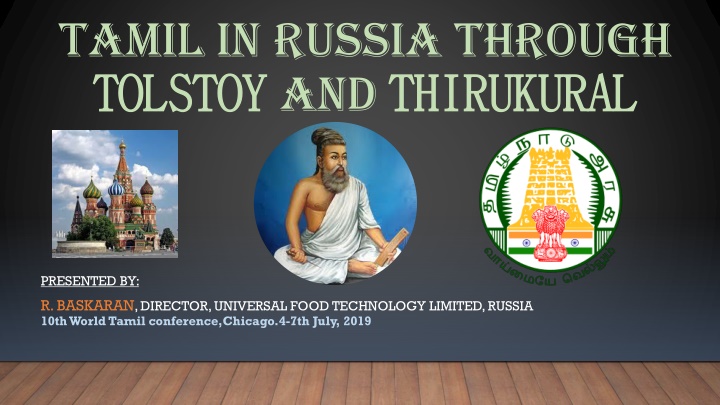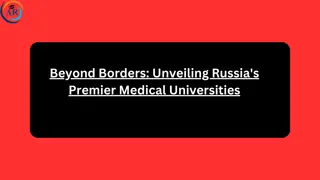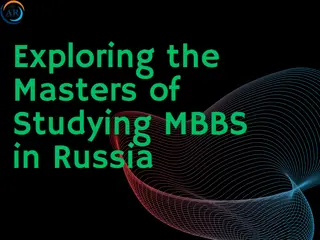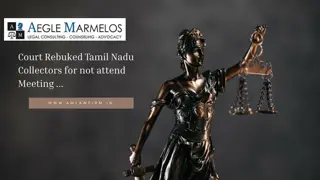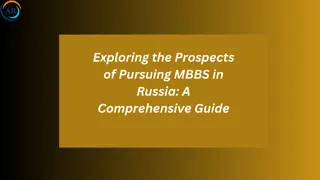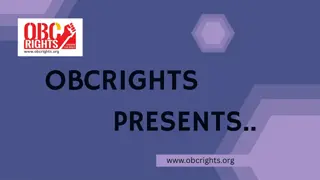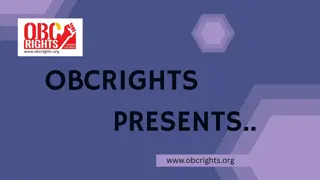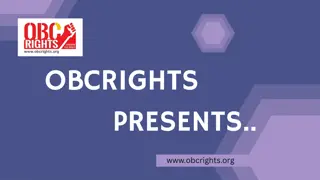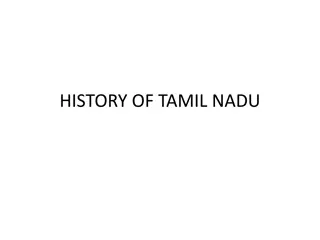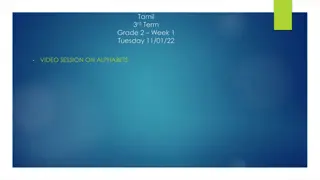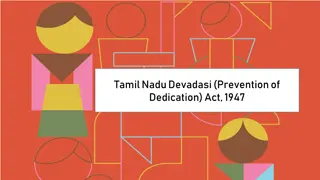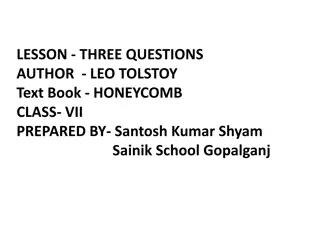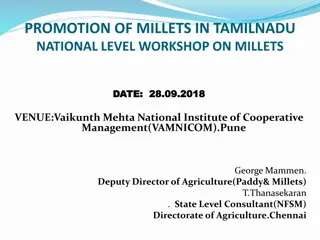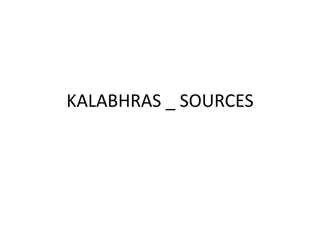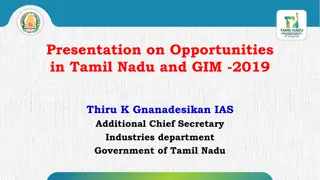Tamil Influence in Russia: A Cultural Journey Through Tolstoy and Thirukural
Exploration of Tamil language and culture in Russia, from 18th century interactions with Empress Ekaterina II to the post-World War II revival led by scholars like Poornam Somasundaran. The study of Tamil in Russia, marked by significant figures such as Alexander Mervart and Yuri Glazov, reflects a deep appreciation for the language's rich literary tradition and philosophical depth.
Download Presentation

Please find below an Image/Link to download the presentation.
The content on the website is provided AS IS for your information and personal use only. It may not be sold, licensed, or shared on other websites without obtaining consent from the author.If you encounter any issues during the download, it is possible that the publisher has removed the file from their server.
You are allowed to download the files provided on this website for personal or commercial use, subject to the condition that they are used lawfully. All files are the property of their respective owners.
The content on the website is provided AS IS for your information and personal use only. It may not be sold, licensed, or shared on other websites without obtaining consent from the author.
E N D
Presentation Transcript
TAMIL IN RUSSIA THROUGH TOLSTOY TOLSTOY AND THIRUKURAL THIRUKURAL PRESENTED BY: R. BASKARAN, DIRECTOR, UNIVERSAL FOOD TECHNOLOGY LIMITED, RUSSIA 10th World Tamil conference,Chicago.4-7th July, 2019
TAMIL IN RUSSIA THE EARLY YEARS 18th Century - The dictionary A comparative Vocabulary of Languages and Dialects refers to Dravidian languages with a specific mention of Tamil . This was published under the patronage of Empress Ekaterina II ( also knows as Catherine the Great) 19th Century The Brockhaus and Efron Encyclopedic Dictionary , published in Saint Petersburg, Russia, in 1890 1907, contains a special article devoted to Tamil. A Circle of Readings ( Krug Chtenia), authored by Leo Tolstoy is a collection of quotes of wisdom from sages around the world contains many Kurals from the Thirukkural, translated into Russian from French.
TAMIL IN RUSSIA BEGINNINGS Study of Tamil in Russia gained momentum in the 20th century, especially in the Post War period. Post the Great October Revolution in 1917 and the ensuing civil war, study of Indian languages and culture received a big boost from the Soviet State Alexander Mervart, a German born ethnographer and linguist, associated with the prestigious St Petersburg Academy of Sciences, visited India and Sri Lanka during 1914- 1918 along with his wife . Together, they collected huge amounts of ethnographic material including manuscripts of Dravidian languages, especially Tamil. On returning home they published a "Report on the Ethno-graphical Expedition to India in 1914-18 Among many of his publications, the most notable is A Grammar of the Tamil Colloquial Language in 1929, the first book in Russia dealing with Dravidian languages. Mervart also taught Tamil in the Leningrad Institute of Oriental Languages. Unfortunately, he was arrested on political ground and died in prison in 1932
TAMIL IN RUSSIA : POST WW-II The revival of Tamil in Soviet Union started after the Second world war, particularly during the period of the Soviet leader Nikita Khrushchev. Poornam Somasundaran came to the Soviet Union in the 60 s and started teaching Tamil to the Soviet people. He was also a brilliant translator and editor of two Tamil dictionaries published in Moscow. Yuri Glazov, a student of P. Somasundaran, went on to teach Tamil to many Soviets, including Professor Alexander Dubyanskiy. In 1962 Y. Glazov defended his Doctorate thesis dedicated to "Thirukkural . Other famous students of P. Somasundaran included Mikhail Andronov , Alexander Pyatygorsky, Vladimir Makarenko. Semen Rudin ( popularly known in Tamil Nadu as SEMBIAN) learned Tamil by himself and in 1958 organized a Tamil group in St. Petersburg University in the faculty of Oriental languages.
TAMIL IN RUSSIA : INSTITUTIONS (1/2) As once of the ancient languages of the World, Tamil attracted lot of attention from the Soviet education fraternity. Many initiatives related to teaching and translating Tamil literature were started during the 60s. Today, there are 5 different translations of this classical book into Russian. A Tamil department was opened in Moscow State University in 1965. The first group of Russian Tamil scholars in Moscow graduated in 1965-70. From 1970 till 2017 there were 7 groups. Each group used to study for 4-5 years either full time or part time. Sergey Strokan was one among them and he is now a well known journalist. Yuri Glazov was the first teacher there. He undertook some important translations from Tamil to Russian, notable amongst those are Thirukkural and Silappadigaram Dr.A.M. Piyatigorsky, Moscow philosopher, specializing in Tamil Saiva Siddhanta, published Tamil Literature in 1966 " dealing with the history of ancient mediaeval and modern Tamil literature
TAMIL IN RUSSIA : INSTITUTIONS (2/2) In 1979 a book of translations from the Sangam poetry ( Poems on palm-leaves ) was published in Moscow, prepared by Prof. Alexander Dubyanskiy. At present Professor Alexander Dubyanskiy is teaching Tamil as second language to two small groups who are studying Singhalese and Hindi in Moscow State University. Alev Ibrahimov started to translate the works contemporary Tamil writers like Kalki, Jayakanthan and Alagirisamy. Vitaliy Furnika, a student of Semen Rudin, did considerable work in propagating modern Tamil literature Two Tamil groups were organized in the Russian State University of Humanities (1994-1999, 2009-2014).
TAMIL IN RUSSIAN MEDIA Moscow Radio used to broadcast in several Indian languages. The broadcast in Tamil started in the mid 1950 s. After the disintegration of Soviet Union, it stopped broadcasting in Tamil in early 1990 s. Nikolay Gordeychuk is conducting Tamil lectures for various years on YouTube. Progress Publishers founded in 1931 had a big Tamil Department and from the mid 1950 s Political, Economic, Philosophical, Social books apart from lots of Child literature and Literary works were translated directly from Russian in to Tamil.
TAMILIANS IN RUSSIA About 20-25 Tamilian families currently living in Moscow, Russia 2500 students from Tamil Nadu studying in various universities. Russia Tamil Sangam, Moscow holds annual cultural programs and events to bring together the Tamilian population in Moscow. Prominent Tamilians in Moscow: Mr. Jeevanandam from Virudhunagar : Owner of chain of shops selling Indian Spices and so far the only successful outlet of such type in Russia. Mr. Kasi Viswanathan from Tenkasi : Owns Indian Restaurants in Moscow and St Petersburg and operates a successful tourism business. Mr. Rajagopalan from Madurai : operates timber exporting business Mr. Vijaykumar from Chennai : represents a big ophthalmology group from Tamil Nadu in Moscow. Ms. Padmalochana Mahadevan from Chennai : runs a successful Indian Kindergarten in Moscow for more than 25 years. Mr. Mahesh Mahadevan from Madurai: country manager of Delta Wilmar, an active participant in the Tamil cultural scene in Moscow.
